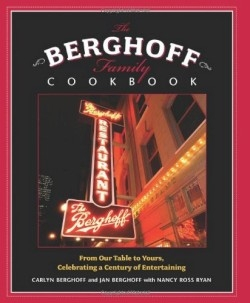The Berghoff Family Cookbook
From Our Table to Yours, Celebrating a Century of Entertaining
After 107 years of continuous family ownership and operation, the Berghoff Restaurant closed its doors in February 2006. The line of hopeful diners during its last moments stretched down the block like mourners paying their respects to a famous dignitary. This cookbook offers a postscript to that legacy, as a way to sample the past while demonstrating how the Berghoff tradition continues to evolve.
Like its enterprising progenitor Herman Berghoff, this is an effort of many strengths, serving as cookbook, fascinating history, and fairly thorough event-planning guide. The recipes are enlivened by stories from the restaurant years, such as “The Mashed Potato Lady” who refused to believe the potatoes were made from scratch, and vintage photos of huge shipments of hearty men enjoying a pint at the long bar, and beef sides delivered in the age before refrigerated trucks.
The whole is introduced with a thorough history of the family and restaurant, which began when Herman Berghoff left Germany at age seventeen. Having successfully created an Indiana brewery, Berghoff came to Chicago to expand his market, but was not granted a wholesaler’s license. He instead obtained a retail license and opened up shop, offering a free sandwich with his beer. When Prohibition struck, he survived by expanding the sandwich to a full menu. Perhaps a sign of his rise in prominence, when Prohibition ended, Berghoff was granted the city’s first liquor license.
The Berghoff’s recipes are the core of this book, divulging the secrets to everything from their famous creamed spinach (the only dish not entirely from scratch), to their flaky apple strudel. It’s an inviting spread of honest food, which sounds and looks delectable, though most of the dishes are beige or golden brown in color. The Berghoffs are well aware. “The Wiener Schnitzel, Osso Buco, Sauerbraten, and even Corned Beef and Cabbage are basically brown. They taste a thousand times more interesting than they look,” the author writes. Equal billing is given to Herman’s great-granddaughter Carlyn Berghoff’s recipes created for her catering business and new restaurant, which now operates out of the old restaurant location. Where the restaurant offered old-world German goodness, Carlyn’s recipes show the evolution of a culinary heritage and her training at the Culinary Institute of America. Her offerings include a tempting Chicken Valenciano and Almond-Pear Tartlets.
None of the recipes are overly complicated, and even Carlyn’s offerings would not be termed exotic except by the most sheltered palates. What results is a delectable and engrossing resource of interest to the legions of loyal Berghoff diners or anyone hungry for a slice of Chicago culinary history.
Reviewed by
Naomi Millán
Disclosure: This article is not an endorsement, but a review. The publisher of this book provided free copies of the book to have their book reviewed by a professional reviewer. No fee was paid by the publisher for this review. Foreword Reviews only recommends books that we love. Foreword Magazine, Inc. is disclosing this in accordance with the Federal Trade Commission’s 16 CFR, Part 255.

